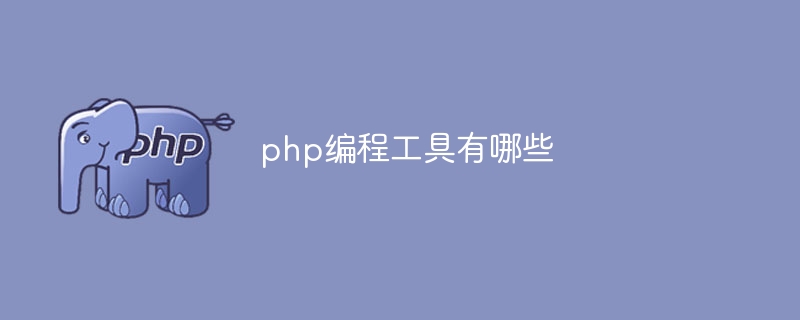
Commonly used PHP programming tools include: 1. Text editor, which provides code editing, syntax highlighting, auto-completion and other functions; 2. Integrated development environment, which provides editing, debugging, testing, code analysis, etc. Multiple functions; 3. Debugging tools, useful assistants for finding and fixing code errors; 4. Unit testing framework, used to ensure the correctness of each code unit; 5. Performance tools, used to analyze and tune PHP applications Program performance; 6. Database management tools; 7. Version control tools and other programming tools.

The operating environment of this tutorial: Windows 10 system, PHP8.1.3 version, Dell G3 computer.
As a popular server scripting language, PHP has many powerful programming tools to support developers in PHP programming. These tools provide a variety of functions, including editing, debugging, testing, performance optimization, and more. In this article, we will introduce some commonly used PHP programming tools.
1. Text editor
Text editors are the basic tools for PHP programming. They provide functions such as code editing, syntax highlighting, and auto-completion. Some popular text editors include Sublime Text, Visual Studio Code, Atom, etc. These editors also support plugins to add various features as needed.
2. Integrated Development Environment (IDE)
The IDE is a full-featured programming tool that provides multiple functions such as editing, debugging, testing, and code analysis. They usually integrate text editors, debuggers, command line terminals, etc. Popular PHP IDEs include PhpStorm, Eclipse, NetBeans, etc. IDE has more complex functions and better visualization effects, and is suitable for the development of large projects.
3. Debugging Tools
Debugging tools are useful assistants for finding and fixing code errors. They can help developers analyze variable values, function calls, etc. during code execution. Xdebug is a popular PHP debugging tool that can be integrated with various IDEs and editors to provide powerful debugging capabilities. Other debugging tools include Zend Debugger, XHProf, etc.
4. Unit testing framework
Unit testing is a method used to test a single unit of code to ensure the correctness of each unit of code. PHPUnit is a popular PHP unit testing framework that provides rich assertions and test organization features to help developers write high-quality code.
5. Performance Tools
Performance tools are used to analyze and tune the performance of PHP applications. XHProf is a powerful tool for performance analysis, which can collect application performance data and generate visual reports. There are other performance tools, such as APC, OPCache, etc., which can provide code caching and optimization functions to speed up the application.
6. Database management tools
PHP usually interacts with the database, so database management tools are very important. phpMyAdmin is a popular MySQL database management tool. It provides a graphical interface to manage the database, and can perform operations such as data import and export, query and table structure modification. Other database management tools include Navicat, Sequel Pro, etc.
7. Version control tools
Version control tools are used to manage code versions and can help developers track modifications, merge and rollback of code. Git is a popular distributed version control system that makes it easy to manage code bases, branches, and modification history. There are other version control tools, such as SVN, Mercurial, etc.
Summary
The above are some commonly used PHP programming tools. Based on personal needs and the size of the project, developers can choose the tools that suit them to improve development efficiency and code quality. Whether it's text editors, IDEs, debugging tools, or performance tools, they all help developers make PHP programming easier and provide a better development experience. Let's use these tools to create better PHP applications.
The above is the detailed content of What are the programming tools for PHP?. For more information, please follow other related articles on the PHP Chinese website!